Costs for College Education is Still Worth It, But it Depends on the Major
“Is college worth the cost and the time commitment?” The answer is definitely “Yes". Extensive research has shown that a degree is still the best way to boost earnings in the long term. Despite the cost and debt, going to college with good lecturers pays off in the long run with enhanced employment prospects and increased earnings once the graduate finishes the degree and gets a job.
Unemployment for students with a new Bachelor’s degrees is less 50% of that for students with a recent high school diploma. However there are major differences between majors and this may affect the decision about which degree to undertake. Some of the trends are temporary related to the economic downturn but other are more or less permanent. It pays to understand what degrees offer the best prospects.
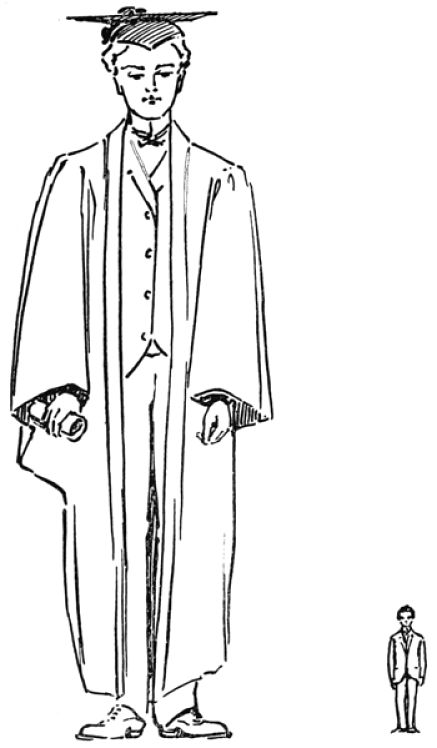


A new report, based on 2009-10 census data, provides very interesting statistics comparing the earnings and jobless rates for students doing different degrees and majors. Data for three types of graduates was compared:
- Recent college graduate - people who are 22 - 26 years old
- Experienced college graduate - people who are 30 to 54 years old
- Graduate Degree holders have second degrees and is limited to people 30 to 54 years old.
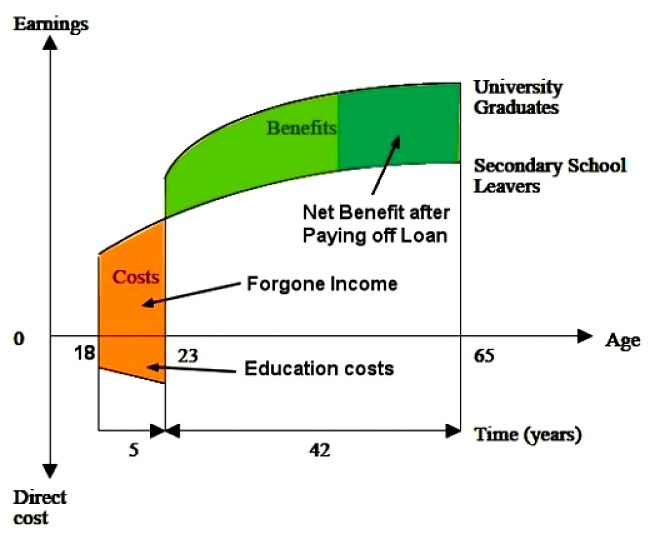
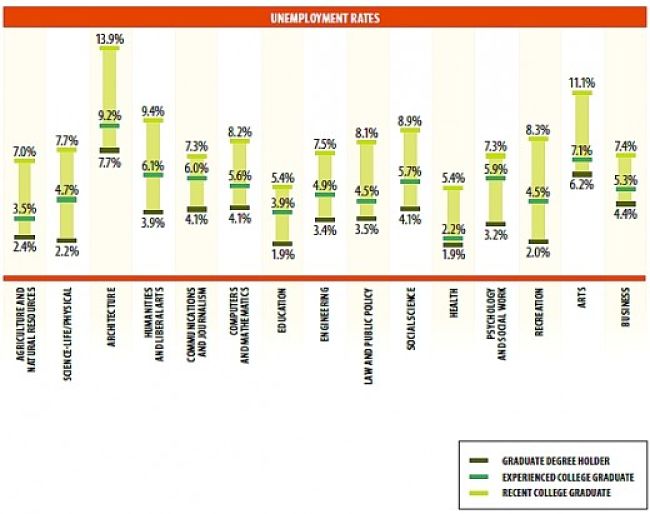
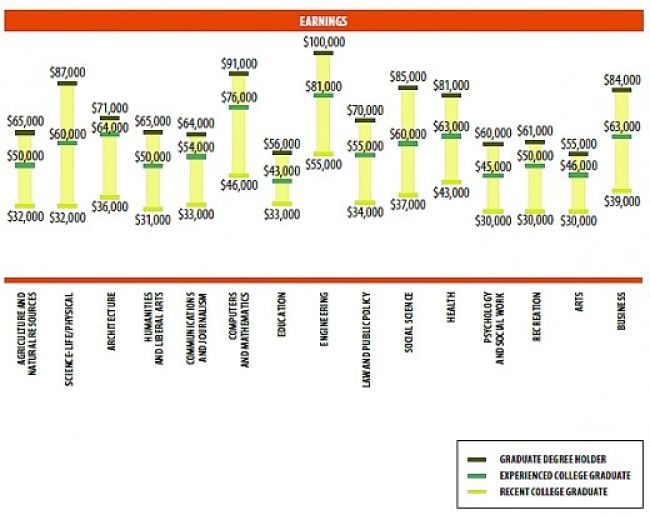
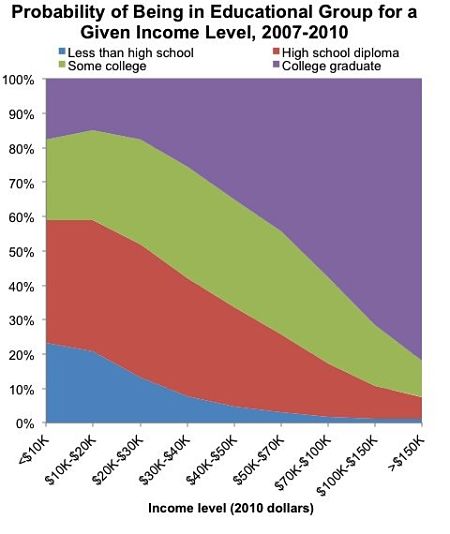
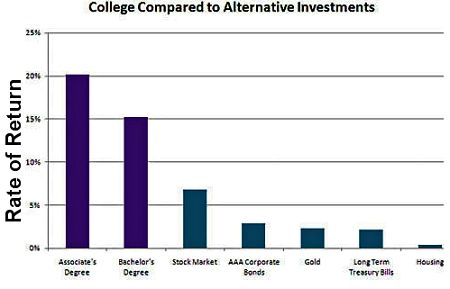
The last two images above provide the most convincing argument as it clearly shows that people in the higher income brackets are more likely to have gone to college.
Research shows that in America of the people with salaries over $150,000, 80% had a bachelor’s degree or higher and about 6% only had a high school diploma.
Comparing the education debt to returns on other types of investment also shows a far greater long term return compared to investing in the stock market, corporate bonds, long-term Treasury bills, housing or gold.
Major Findings
Unemployment risks for recent college graduates varies between majors - In the study the unemployment rate was highest in Architecture (14%) perhaps linked to the collapse of the building industry in the recession. The rates were generally higher in non-technical areas, such as the Arts (10%), Humanities and Liberal Arts (10%), Social Science (9%) and Law and Public Policy (8%).
Unemployment in computers and mathematics vary widely depending on the speciality - Computer specialists who can write software and develop new applications did better.
Majors aligned with particular occupations showed lower unemployment rates - Majors such as Education, Healthcare and technical occupations with well-defined jobs had lower unemployment rates than more general majors, like Humanities and Liberal Arts where the jobs were less defined and spread amongst a wide range of employers.
Majors that are closely aligned with a speciality can misfire for those with lower grades - Tying oneself to a particular can be a two-edged sword. Potential income can be high but so can unemployment rates. Unemployment rates for recent Architecture college graduates was high at 14% percent and for experienced college graduates at 9%. It is hard to get a job outside of the special area.
Graduate degrees tends to reduce unemployment rates - The unemployment rate for people with graduate degrees is 3%, which is about half for those with a BA (5%). Overall the unemployment rates for people with graduate degrees ranged between 2-4%.
Majors in subjects that are technical like the humanities, arts and social science, had higher unemployment rates.
The most stable employers for recent college graduates is in Healthcare, Education, Business and Professional Services. Unemployment rates were 5% for recent college graduates in Healthcare and Education, 7% in Psychology and Social Work, and 8% in the Life and Physical Sciences. About 60 % recent college graduates who had a job were working in the Healthcare, Education, Business and Professional Services sectors.
Computer majors are likely to recover strongly as at the end of the economic downturn - The unemployment rate for recent college information systems graduates was quite high at 12%, more than twice the rate for experienced workers at 5%. This suggests that unemployment rates are likely to fall as the economy recovers.
Salaries depend on the choice of majors. Median salaries for recent graduates ranged from about $55,000 for Engineering majors to about $30,000 in the Arts, Psychology and Social Work categories. Engineering majors have the highest earnings for both recent and experienced college graduates followed by Computer and Mathematics majors, and Business majors. Recent Healthcare graduates start out with high earnings, but lose ground to Science, Business and Engineering graduates as they get older.
Majors with the lowest unemployment rates don't make much money -Graduates in psychology, education and social work have low unemployment rates, and have low salaries at the start and as experienced employees. Some majors offer both high security and high earnings. For others there may be a trade-off between earnings and job security. This may depend on college grades and creativity - the best rise to the top in any profession.
College education increases earnings across the board - The average earnings for a graduate is now $48,000 compared with $62,000 for graduate degrees. With the exception the Arts and Education, earnings for graduate workers range between $60,000 and $100,000.
Conclusion
High school students who can go on to college should do so. But not all college degrees and created equal. Students and parents should do their homework before picking a major and consider short and long term employment prospects and salaries together with personal preferences, aptitude and capabilities.